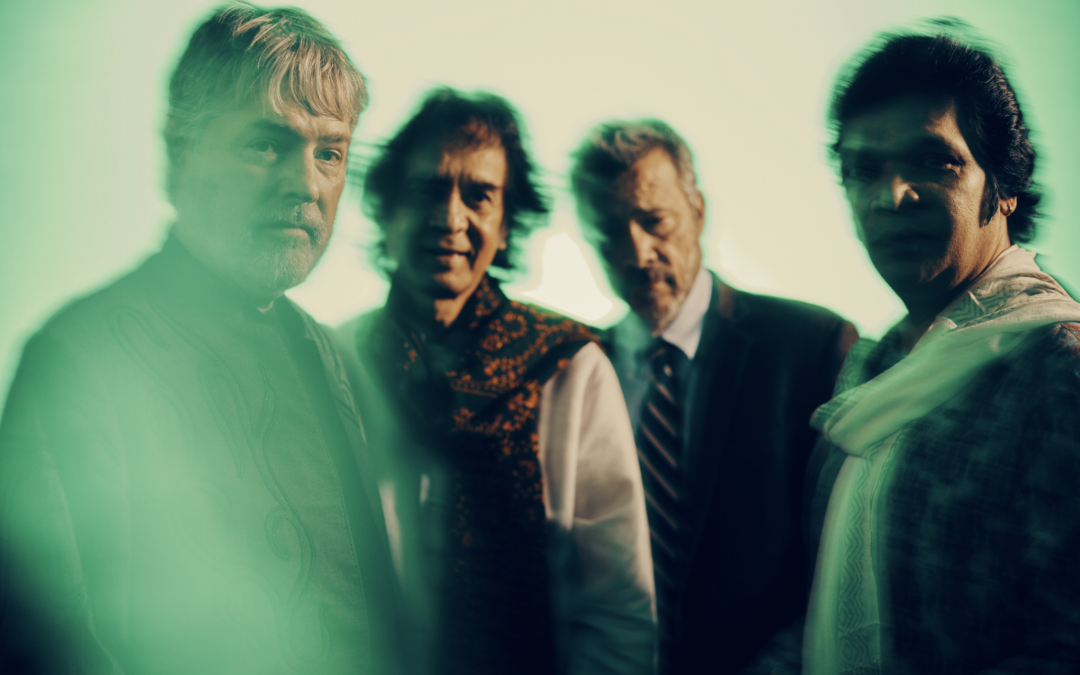By Jeff Maisey
Banjo legend Béla Fleck has been keen to expand the boundaries of his instrument, composing, performing, and exploring the realms of acoustic music in jazz, Western classical, bluegrass, and within the complex world of classical Indian.
Together with classical upright bassist Edgar Meyer, Indian tabla virtuoso Zakir Hussain, and flutist Rakesh Chaurasia, Fleck and friends have produced a new album — “As We Speak” — of work that brilliantly weaves various genres and influences into a rhythmically pleasing psychedelic kaleidoscope of pure joy.
In 1979, Fleck debuted as a solo recording artist with the album “Crossing The Tracks,” and he’s been crisscrossing the musical landscape ever since with collaborative releases such as “Tales from the Acoustic Planet, Vol. 3, Africa Sessions,” “The Melody of Rhythm,” “Perpetual Motion,” and last year’s “My Bluegrass Heart,” as well as three albums with Abigail Washburn, and a trio of Flecktones records including “The. Hidden Land.”
With “As We Speak,” Fleck returns to the fascinating soundscape of blurring the lines of World Music.
In advance of the group’s short two-week tour, I caught up with the ultra-busy Béla Fleck to get some insights into the making of the new album.
VEER: On March 3, “Owl’s Misfortune” was the first song released from your upcoming album, “As We Speak,” a collaboration with Zakir Hussain, Edgar Meyer, and featuring Rakesh Chaurasia. There’s a lot going on within this piece where the musical styles of each player are clearly definable, and yet it flows so well and is in sections reminiscent of cross-cultural music like the Silk Road Ensemble’s “New Impossibilities” album, Jai Uttal’s “Footprints,” and some of Ian Anderson’s (Jethro Tull) solo recordings. Did you feel this particular song best represented the collection of material composed for “As We Speak”?
Bela Fleck: This is one of many diverse pieces on the album and not intended to represent the whole album, but rather a first foot in the water. Hopefully it is warm enough that you’ll want to jump in! We had to start somewhere, and this felt welcoming…
VEER: Which songs from “As We Speak” came from ideas resulting from live improvisational moments from previous tours with Meyer and Hussain?
Bela Fleck: I wouldn’t say that is how these pieces were created, although our time performing together certainly informed us of the potentials and possibilities that the combination could embody. Each of the three writers write differently. I usually write with my instrument in hand, inspired by the sound, digging out tunes and lines. Zakir conceptualizes and then sings to us his compositions, while Edgar tends to spend a lot of time sculpting a composition either on paper or at a keyboard, and more rarely on the bass itself.
VEER: In the composing phase of these 12 tracks, is it the preference to write songs together “in-person” or via electronic music track sharing for convenience (time and expense)? What is that process like?
Bela Fleck: We send each other things to hear, whether its a VM of me or Zakir singing or playing something, or a midi file that Edgar creates. Generally speaking Zakir and I tend towards leaving a lot blank for the others to fill in naturally, while Edgar is more likely to suggest exact notes or rhythms.
VEER: What have you learned about the complexities of traditional Indian music in working with Zakir?
Bela Fleck: Wow — how awesome it is? I literally pinch myself to realize I am really playing with Zakir. Edgar I also revere but we are pals for so long, I got over that! Rakesh is mind bogglingly great as well, and helps bring more light to the incredible Indian musical cosmos, as he is so uniquely different from Zakir. Ed and I are highly inspired by their math, melody and groove, and try to bounce our own ideas off of them to see what splatters!
VEER: What are your thoughts on the tonality of these acoustic instruments and how they can compliment each other when interwoven into new compositions?
Bela Fleck: It helps when all the musicians are masters of their tone. Each person puts a lot of attention into the sound they are putting out, and so they tend to blend beautifully. The fact that we are all acoustic musicians, playing at a relatively low volume makes the balance come together rather naturally.
VEER: As a string instrumentalist have you explored the sitar?
Bela Fleck: I have sat with a sitar long enough to know that messing with it will destroy my fingers. These guys have to have ridiculous calluses to play that instrument. But I maintain my commitment to the banjo’s sound, and learning new music on the banjo. When I was a kid people would ask me, why don’t you learn to play the guitar or saxophone if you want to play jazz, and I realized that I experience music through my banjo. That’s my voice and that’s the instrument I want to learn new language on.
VEER: The group is touring for one month in advance of the full length album becoming available. Will you be selling CDs exclusively at these concerts as an “opportunity” for those who attend to obtain the new work before anyone else, or was the tour in support of the album scheduled due to each of your other projects/obligations?
Bela Fleck: We do expect to have CDs and LPs for sale at the shows. They just showed up and look great.
WANT TO GO?
As We Speak: Béla Fleck, Edgar Meyer, Zakir Hussain, featuring Rakesh Chaurasia
Presented by Virginia Arts Festival
May 3
Perry Pavilion




